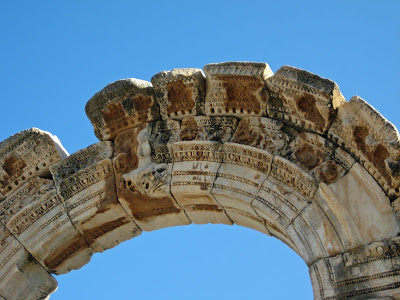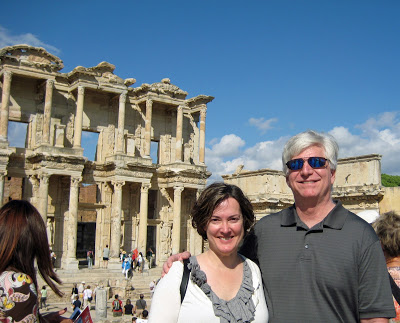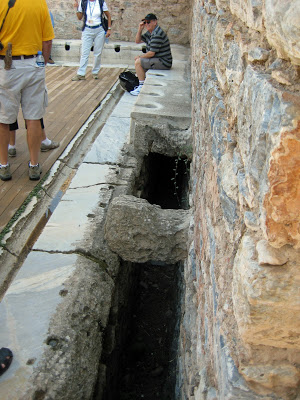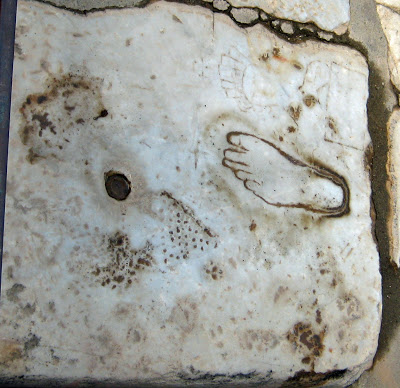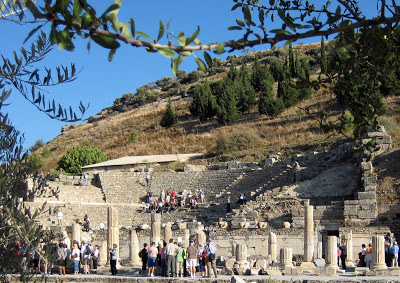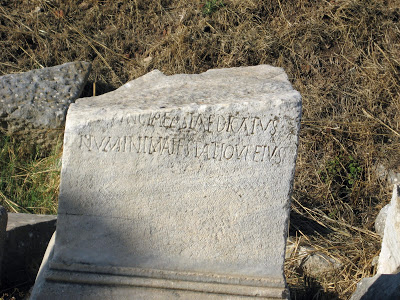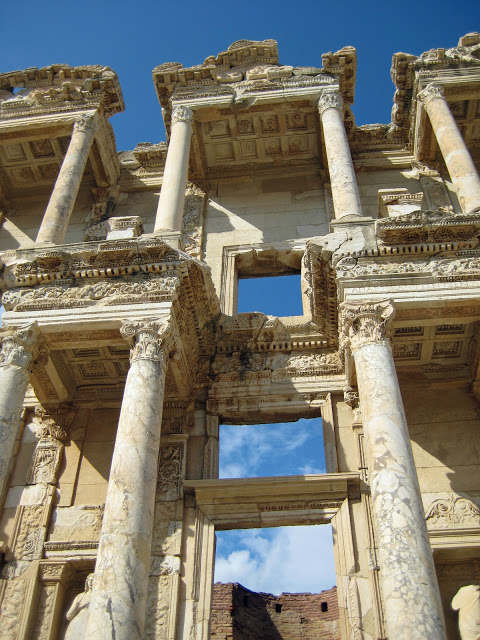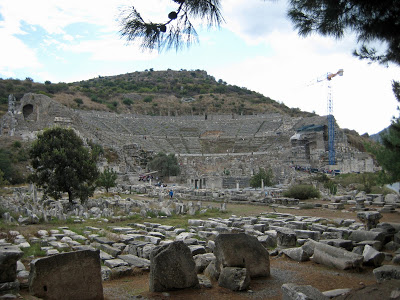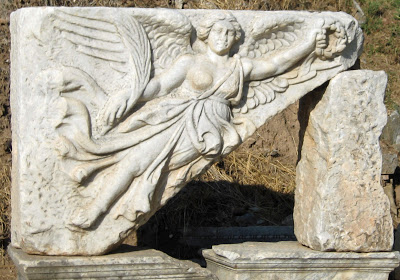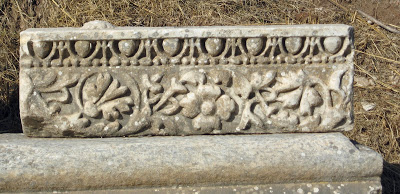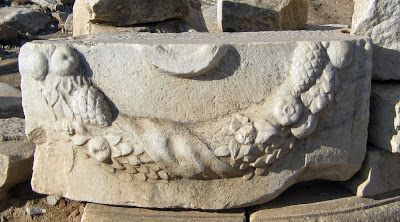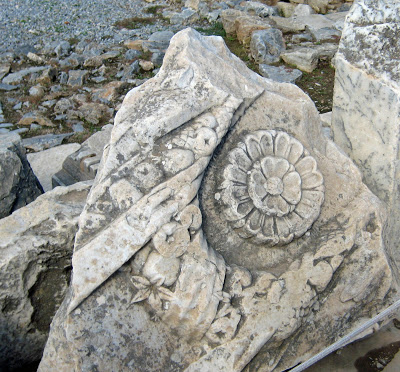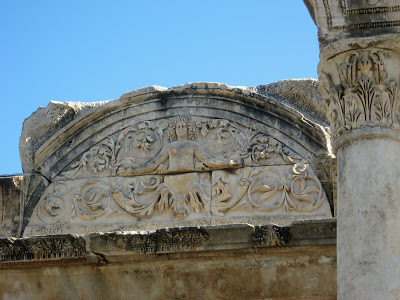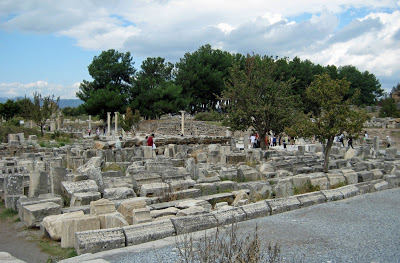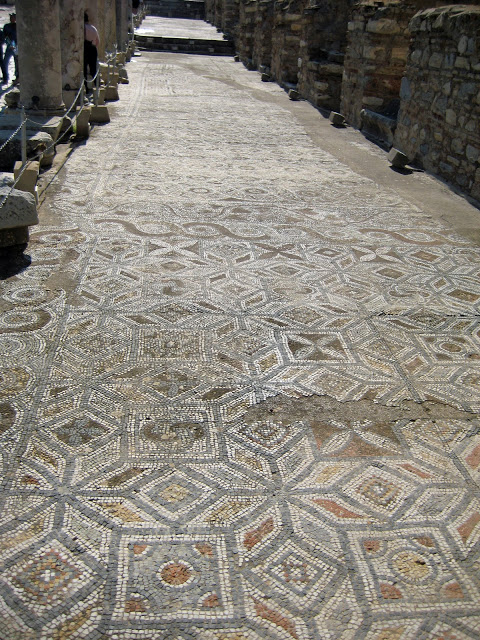Although I always thought I'd some day arrive on the continent of Asia traveling west from the U.S., my first steps in Asia were actually from the East and maybe that's exactly how it was meant to be.
Before this trip of ours I'd never heard of Ephesus, which if you haven't either is in Turkey on the continent of Asia. Knowing what I know now, which isn't much, I realize that was really due to ignorance of a whole bunch of history. In any case , reading about potential excursions from our port stops I promptly marked the day visit to Ephesus as my number one priority. A chance to walk through both Greek and Roman ruins sounded like nirvana to me. I loved Pompeii and this promised to be at least equally as interesting.
My husband and I in front of the Library of Celsus
Today this area of Turkey is pretty rural after leaving the port city of Kusadasi. If you've been to California or other countries along the Mediterranean in the late summer, it has a similar dry look but even more so I think as there are few trees. As one drives from Kusadasi to Ephesus one cannot help but wonder why it is so desolate with its closeness to the Aegean Sea and surely commerce. Indeed it was extremely wealthy at one time due to its natural harbor that one can only imagine now since it's silted in for miles.
Public Toilets
Per Wikipedia (and our local guide): "The first known example of 'modern style' graffiti survives in the ancient Greek city of Ephesus (in modern-day Turkey). Local guides say it is an advertisement for prostitution. Located near a mosaic and stone walkway, the graffiti shows a handprint that vaguely resembles a heart, along with a footprint and a number. This is believed to indicate that a brothel was nearby, with the handprint symbolizing payment."
Odeon - small theater
What makes it even more remarkable is that the area has been inhabited since before 6,000 BC! Yes, that's 3 zeroes BC! The major periods in human history have played out here: from the Neolithic Age to Bronze Age to the Dark Ages to the Archaic, Classical, and Hellenistic Periods, Roman, Byzantine, and finally what's considered the Turkish era starting in the early 14th century. Makes me tired just typing that list!
For Christians it is a very special place as it is believed to be the last home of Mary, the mother of Jesus. The apostle Paul lived and preached in Ephesus. There are walkways, stairs and stones that he and the Virgin Mary must have walked on those many years ago.
Grand Theater - holds 25,000
(Note: The Grand Theater was built in 3 BC by the Greeks and later modified by the Romans. In recent years there have been concerts by Pavarotti, Sting, and even Tom Jones! held in the Great Theater. The acoustics are amazing and the view from the seats is down the Arcadian Way and towards the sea.)
It was so mind boggling to contemplate all of this that for the most part I just let the architecture, landscape and art visually sing to me while opening my ears to listen to our wonderful tour guide in hopes some knowledge would find and stick to brain cells.
Here's something that stuck: There are more Roman ruins in Ephesus than anywhere else in the Eastern Mediterranean area, but they believe only 15% have been uncovered! There were fallen columns, stone walls, carvings everywhere you looked. This would be the perfect place for the 20-something archaeologist me to go and dig!
puzzle pieces
Next post I'll share photos of the Terrace Houses of Ephesus.

